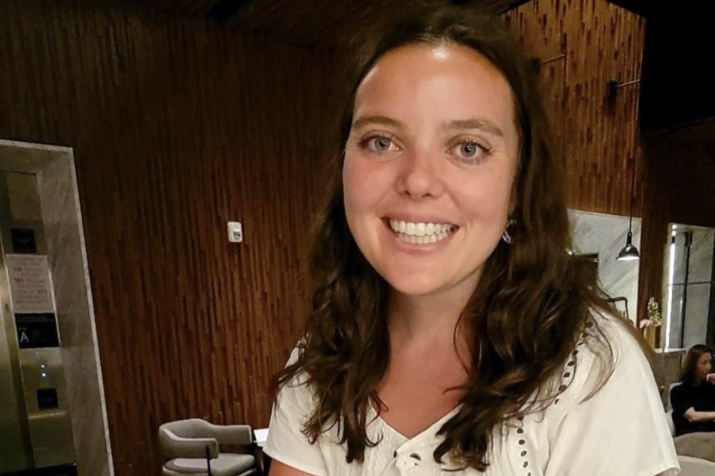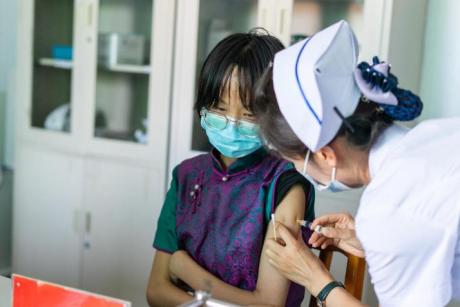
Hope Arcuri leverages her global health education to raise awareness of the needs of refugees and displaced people.
Published August 3, 2022, last updated on August 4, 2022 under Alumni Stories
Early on in her career, Hope Arcuri AB’18 had some misconceptions about public relations. “I viewed PR as crazed professionals trying to get corporations out of scandals,” she says. But after graduating with a degree in public policy and global health, she started to see a more altruistic power in public messaging.
Now a senior communications officer with the International Rescue Committee (IRC), Arcuri helps raise awareness about the efforts of one of the world’s biggest nonprofits working to aid refugees and displaced populations. A self-described “data nerd” who loves tracking media insights, she says the job is “a beautiful combination of writing and data savvy, and I genuinely feel like I’m making a difference in the world.” But it also doesn’t hurt that the job sometimes means hanging out with media celebrities like Oprah Winfrey.
DGHI communications intern Caleb Veal caught up with Arcuri to talk about her work and how it relates to her global health education. Arcuri’s responses, sent by email, have been edited for length and clarity.

Hope Arcuri, right, and International...
Tell us more about your work.
I absolutely love my job! I work for the International Rescue Committee (IRC), one of the largest humanitarian aid organizations in the world, which works in 40 countries and 26 U.S. cities to provide aid to refugees and displaced people. I lead our U.S.-market communications about our international programs, meaning I help U.S. media outlets cover important crises such as Ukraine, Afghanistan, Syria and Yemen.
I supported Oprah’s production team to visit our work along the U.S.-Mexico border for a feature on Oprah’s Book Club on Apple TV+. I helped CBS Sunday Morning, 60 Minutes and other top-tier TV shows highlight the plight of the Afghanistan crisis in the shift in power last fall. Right now, during the Ukraine crisis, we’re doing a lot of innovative and creative campaigns to increase coverage on the human suffering of the Ukraine war. One of my favorite stories so far was when Ari Shapiro from NPR’s All Things Considered visited our programming in Poland to interview Polish teachers trying their best to teach Ukrainian child refugees who are all of a sudden in their classrooms. Their dedication to crossing language barriers and creating a better future for these Ukrainian children is really beautiful.
What motivated you to pursue global health?
Global health showed me that a lot of the Global South is facing crises that are very interrelated. Health issues are often because of poverty which is because of lack of access to education which is because of limited women’s rights, etc. The interconnectedness of poverty and health really inspired me to pursue a career in aid. I felt that because I understood these nuances at an intellectual level that I could bring a lot to the field from a writing and advocacy standpoint.
I originally started in advocacy, but realized I liked communications a lot more. I viewed PR as crazed professionals trying to get corporations out of scandals, but it’s really sales for writers. I am essentially writing great messaging to convince reporters to write about whatever topic I’m pitching. It’s a relationship-driven industry, so I spend a lot of time getting coffee with journalists and speaking to reporters on the phone.
Was there a project or experience you had at DGHI that was particularly impactful for you?
Dr. (David) Boyd’s intro class and Dr. (David) Toole’s Systems course both deeply impacted me. Dr. Boyd’s class set off so many intellectual alarm bells – in all the right ways – about how to think about poverty, global health and aid in a more strategic, interconnected and deliberate way. Dr. Toole’s class on systems actually gave me the tools to understand how to make change systematically. The books we read in that class are books I’ve referenced dozens of times over the years.
In what ways did studying global health at Duke prepare you for your current work?
I frankly think the connections at DGHI really catapulted me into my career. The fact that Global Health Strategies (GHS) visited campus and convinced me that Communications was the field for me really jump started my career. GHS is a very well-known agency in the space, so having that on my resume helped me get my incredible job at the IRC. The references I had from amazing DGHI professors really helped. Those relationships are still going strong today, and I love hearing how they’re doing from time to time.
DGHI also taught me how to write about hard topics, and how to push the envelope about aid delivery. To really make change in the aid industry, the status quo is just not going to work. The President and CEO of the IRC, David Miliband, has a famous speech about system failure. The idea is that the systems designed to support vulnerable communities, like the United Nations and the World Health Organization, have failed these communities.
I still remember Dr. Boyd on the first day of Global Health 101 saying that, essentially, the WHO is not doing its job. It made me realize that I can’t take things as status quo; I can’t assume that organizations are succeeding; I can’t assume that certain programming or aid approaches are perfect; to be successful in this career, I should question everything and flip traditional practices on their heads.
What is the best piece of advice you have gotten in your journey?
Someone told me in college to always sit near powerful people. At the IRC, we had an open-air office where we could sit wherever we liked. I always sat next to my senior director so I could hear the ways he thought, understand his priorities, offer to help on items that popped up, and glean a deeper understanding of communications. I credit sitting next to him for propelling me in my career to be promoted three times in three years at the IRC. He’s a friend and mentor now, and believes in me more than I could have hoped for. He has opened a lot of professional doors for me simply because I made myself available.
What inspires you to do the work you do?
I’m inspired by the clients we serve at the IRC. From an Afghan refugee we resettled in the U.S. who now runs his own Afghan restaurant to the Syrian refugee we resettled in the U.S. who provided COVID testing in her community during the pandemic, the people we support are incredibly inspiring. The resilience and determination of our clients and staff living in some of the hardest-hit countries in the world, such as Afghanistan, Syria and Yemen, push me to work harder every day.


